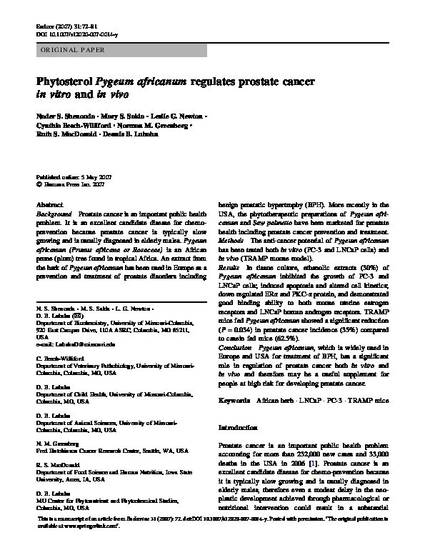
Article
Phytosterol Pygeum africanum regulates prostate cancer in vitro and in vivo
Endocrine
Document Type
Article
Disciplines
Publication Date
5-5-2007
DOI
DOI 10.1007/s12020-007-0014-y
Abstract
Background
Prostate cancer is an important public health problem. It is an excellent candidate disease for chemo-prevention because prostate cancer is typically slow growing and is usually diagnosed in elderly males. Pygeum africanum (Prunus africana or Rosaceae) is an African prune (plum) tree found in tropical Africa. An extract from the bark of Pygeum africanum has been used in Europe as a prevention and treatment of prostate disorders including benign prostatic hypertrophy (BPH). More recently in the USA, the phytotherapeutic preparations of Pygeum africanum and Saw palmetto have been marketed for prostate health including prostate cancer prevention and treatment. Methods
The anti-cancer potential of Pygeum africanum has been tested both in vitro (PC-3 and LNCaP cells) and in␣vivo (TRAMP mouse model). Results
In tissue culture, ethanolic extracts (30%) of Pygeum africanum inhibited the growth of PC-3 and LNCaP cells; induced apoptosis and altered cell kinetics; down regulated ERα and PKC-α protein, and demonstrated good binding ability to both mouse uterine estrogen receptors and LNCaP human androgen receptors. TRAMP mice fed Pygeum africanum showed a significant reduction (P = 0.034) in prostate cancer incidence (35%) compared to casein fed mice (62.5%). Conclusion
Pygeum africanum, which is widely used in Europe and USA for treatment of BPH, has a significant role in regulation of prostate cancer both in␣vitro and in␣vivo and therefore may be a useful supplement for people at high risk for developing prostate cancer.
Copyright Owner
Humana Press Inc
Copyright Date
2007
Language
en
File Format
application/pdf
Citation Information
Nader S. Shenouda, Mary S. Sakla, Leslie G. Newton, Cynthia Besch-Williford, et al.. "Phytosterol Pygeum africanum regulates prostate cancer in vitro and in vivo" Endocrine Vol. 31 Iss. 1 (2007) p. 72 - 81 Available at: http://works.bepress.com/ruth_macdonald/5/

This is a manuscript of an article from Endocrine 31 (2007): 72. doi: 10.1007/s12020-007-0014-y. Posted with permission. "The original publication is available at www.springerlink.com".